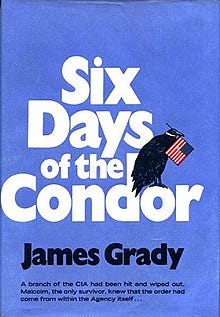Six Days of the Condor
The Spy Novel Written by a Prodigy That Bends Back Infinitely into Reality
James Grady published Six Days of the Condor—an excellent, tight, highly recommended spy novel—when he was just twenty five years old. That’s insane; remember, Tom Clancy was 39 when he published The Hunt for Red October I just listened to the audiobook for the first time. It fits so well into the broader umbrella of The Hunt for Tom Clancy’s مهمة I couldn’t help but include it.
Jim Grady was a writing prodigy from Shelby, Montana, who spent just enough time working for a senator during college at the University of Montana that he was able to write what he knew and imagine the rest—after spending some time out and about, absorbing the world he walked in through the eyes and ears of a novelist.

He did an excellent job in Six Days of the Condor; his verisimilitude with Capitol Hill and the subtle cultural practices among the professional government class who work around there was pretty amazing (I also have some familiarity with the place & the customs of the transients who reside in beautiful houses there); I never experienced Washington DC in the 1970’s (as I was not alive then) but after reading James Grady I feel that I have.
Six Days of the Condor is set in the immediate aftermath of both the Nixon resignation and the Vietnam war. It is is about a CIA front department housed in a Capitol Hill Brownstone behind a phony foundation where nerds sit around and read books in the interest of National Security all day.
The protagonist is Ronald Malcom, a man who got his job with CIA while studying for a Masters in Spanish Literature; having never read Don Quixote, he’s hung over and bullshits a comp exam that asks for extensive analysis of Don Quixote—which he’s never read—by rhetorically sliding over to what he’s interested in: genre fiction. He starts out his exam with this bold play
“The adventures of Don Quixote and Sancho Panza, a team generally regarded as seeking justice, can be compared to the adventures of Rex Stout's two most famous characters, Nero Wolf and Archie Goodwin.”
The bold play pays off. He thinks it might be the end to his graduate school career; instead it’s the invitation into the secret, elite, and ultra-weird liberal arts college with no students that can give an academic with a useless PhD gainful employment, dental, and paid time off—a special access department of CIA’s directorate of intelligence, housed inside the District of Columbia rather than across the river in Langley.






